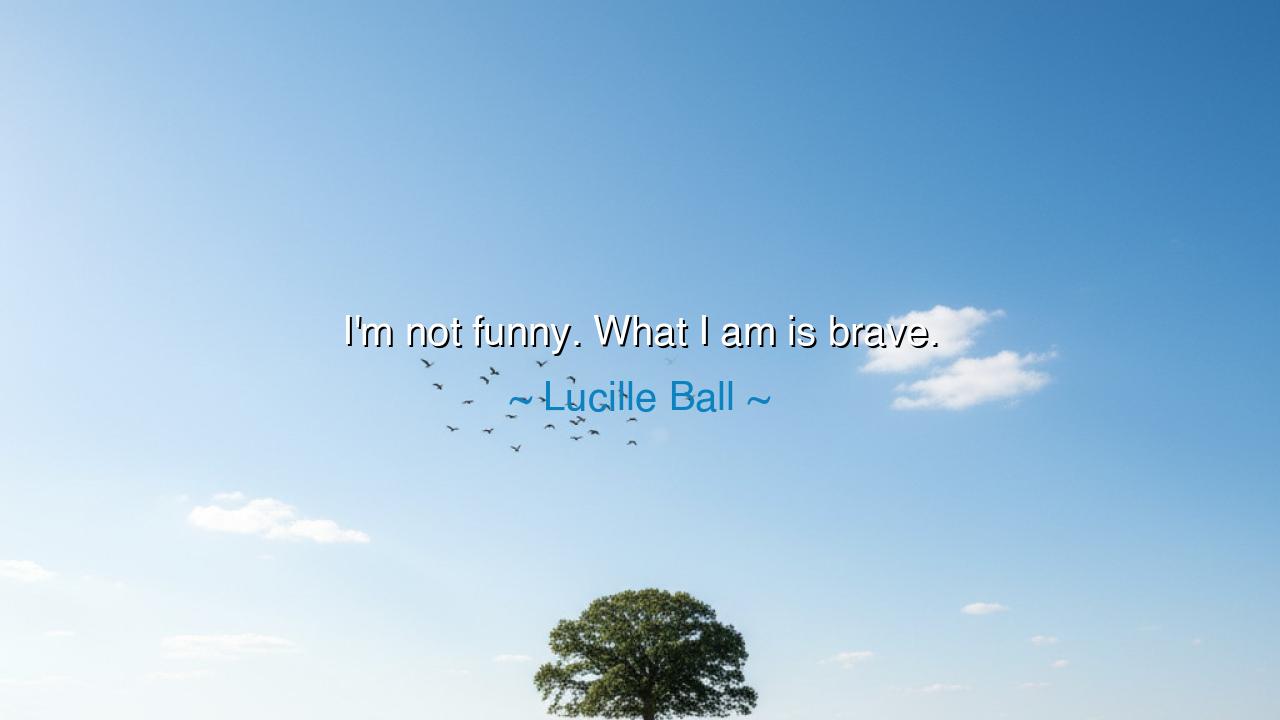
I'm not funny. What I am is brave.






“I’m not funny. What I am is brave.” Thus spoke Lucille Ball, the radiant flame of comedy, whose laughter once echoed through the homes of millions. Yet within this humble confession lies a profound truth about the nature of creation, of courage, and of the human spirit itself. For the world remembers her as a goddess of humor, a master of timing and chaos, a woman who made generations laugh until they wept—but Lucille, with the wisdom of the ancients, stripped away illusion and revealed the root beneath all art: bravery.
To stand before others and make them laugh is to stand naked before judgment. The comedian, though cloaked in laughter, fights an invisible battle each time they step into the light. For humor, though joyous, is born of risk—the risk of failure, of misunderstanding, of rejection. Lucille Ball knew this deeply. She was not content to be merely amusing; she dared to be herself in a world that had little space for women of power, wit, and will. To be “funny,” in her time, was to defy the roles prescribed to women—to trip, to shout, to make faces, to fall into chaos for the sake of art. That, she understood, was an act not of comedy, but of courage.
The origin of this quote reflects the journey of her life—a path not paved in ease, but carved through adversity. Before she became the beloved star of I Love Lucy, she faced rejection after rejection. She was told she lacked glamour, that her voice was strange, that her humor was unbecoming. Yet she persisted. When others saw walls, she saw stages. When she stumbled, she laughed at herself, and in doing so, gave the world permission to laugh at their own flaws. Her bravery was not in pretending to be flawless—it was in embracing her imperfection with fire and grace.
The ancients, too, honored this kind of courage. The Greek dramatists wrote of fools and tricksters, those sacred jesters who revealed truth through laughter. Behind their masks was not mere humor, but wisdom. The fool dared to speak where the king could not. The jester risked ridicule to unveil reality. So too did Lucille Ball—beneath her comedy was rebellion. She made the everyday absurd, and in that absurdity, she found liberation. Through her antics, she showed that the struggle of the human heart could be met not with despair, but with joy.
Her courage extended beyond the stage. When she and her husband, Desi Arnaz, created their own production company, they broke the mold of Hollywood itself. They fought for creative control, for representation, for ownership in an industry that dismissed them. She was the first woman to head a major television studio—Desilu Productions—and through it, she helped bring forth series like Star Trek and Mission: Impossible. Her bravery was not only emotional but visionary: she saw worlds yet unimagined and believed she could create them.
In truth, what Lucille Ball reminds us is that bravery is the mother of laughter. It takes courage to look foolish, to stumble, to reveal one’s flaws to the world. It takes courage to stand where others might mock, and to remain when the silence that follows is unbearable. Laughter, when it is true, is born not of ease but of honesty. The one who dares to be ridiculous becomes the one who frees others from the prison of pride. Lucille’s art was not the art of perfection, but of surrender—to failure, to spontaneity, to truth.
So, dear listener, remember her lesson: do not seek to be “funny.” Seek to be brave. Speak when your voice trembles. Create when the world doubts you. Laugh at yourself before the world can, and in doing so, you will rob fear of its power. For courage is the wellspring from which all art flows. It is the force that transforms fear into expression, vulnerability into connection, and solitude into shared joy.
And when the time comes that you falter or fear, remember Lucille Ball’s words—not as the confession of a comedian, but as the creed of a warrior: “I’m not funny. What I am is brave.” For it is bravery, not talent, that gives life its laughter; and it is bravery, not perfection, that makes the soul immortal.






AAdministratorAdministrator
Welcome, honored guests. Please leave a comment, we will respond soon